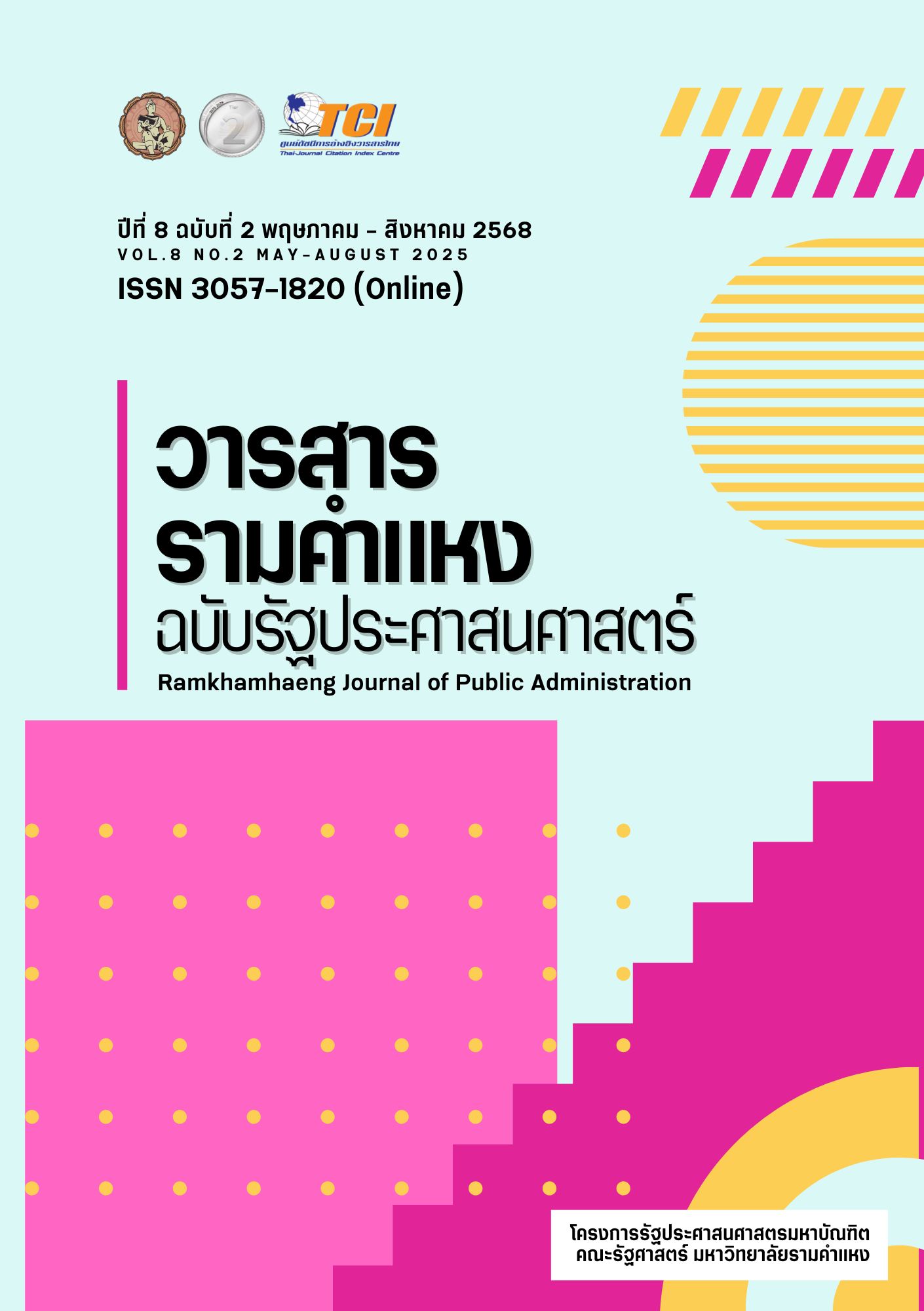กรอบแนวคิดการจัดการคาร์บอนเครดิตในการส่งเสริมการพัฒนาที่ยั่งยืน
คำสำคัญ:
การจัดการ, คาร์บอนเครดิต, การพัฒนาที่ยั่งยืนบทคัดย่อ
การศึกษาครั้งนี้มีวัตถุประสงค์เพื่อศึกษากรอบแนวคิดการจัดการคาร์บอนเครดิตในการส่งเสริมการพัฒนาที่ยั่งยืน โดยศึกษาและทบทวนวรรณกรรมจากแหล่งต่าง ๆ เช่น บทความวิชาการ บทความวิจัย หนังสือ ตำรา ซึ่งผลการศึกษาพบว่า การจัดการคาร์บอนเครดิตเป็นเครื่องมือสำคัญในการส่งเสริมการพัฒนาที่ยั่งยืน โดยมีเป้าหมายหลักเพื่อลดการปล่อยก๊าซเรือนกระจกและสนับสนุนการเปลี่ยนผ่านสู่เศรษฐกิจคาร์บอนต่ำ ประกอบด้วย 1) กลไกตลาดคาร์บอนที่มีประสิทธิภาพ 2) โครงการลดก๊าซเรือนกระจกที่มีคุณภาพ 3) การมีส่วนร่วมของภาคส่วนต่างๆ 4) การกำกับดูแลที่มีประสิทธิภาพ 5) ความรู้และความเข้าใจ 6) เทคโนโลยี และ7) ความร่วมมือระหว่างประเทศ ปัจจัยดังกล่าวสามารถนำไปใช้ในการทดสอบเชิงคุณภาพสำหรับองค์กรที่มุ่งผลการดำเนินงานด้านการจัดการคาร์บอนเครดิตและให้ความสำคัญเกี่ยวกับการพัฒนาองค์กรสู่ความยั่งยืน เพื่อเป็นแนวทางให้ภาคธุรกิจนำไปประเมินและปรับปรุงกลยุทธ์การจัดการคาร์บอนเครดิต เพื่อมุ่งสู่การดำเนินงานที่ยั่งยืน และเป็นข้อมูลสำคัญสำหรับภาครัฐในการพัฒนานโยบายและกลไกสนับสนุนการจัดการคาร์บอนเครดิตอย่างมีประสิทธิภาพในระดับประเทศ
เอกสารอ้างอิง
Carbon Institute for Sustainability. (2023). Global and Thai Commitments to Net-zero Emissions. Retrieved February 15, 2024, https://cbis.institute/2023/04/19/carbon_neutrality/
Fayol, Henri. (1979). General and Industrial Management. London: Sir Isaac Pitman and Sons.
International Emissions Trading Association. (2020). The Role of Technology in Carbon Credit Markets: A Review of Current Trends and Future Opportunities. Retrieved February 15, 2024, https://irinagyurjinyan.wordpress.com/2022/04/12/%D1%83%D1%80%D0%BE%D0%BA-19
International Labour Organization. (2020). Just Transition: Work, Decent Jobs and the Climate Transition. Retrieved February 15, 2024, https://www.ilo.org/media/420401/download.
Intergovernmental Panel on Climate Change. (2018). Raising Public Awareness of Climate Change: A Review of Effective Communication Strategies. Retrieved February 15, 2024, https://www.ipcc.ch/site/assets/uploads/2017/08/Climate-Outreach-IPCC-communications-handbook.pdf
Joseph E. Aldy, Ian W. Horsch, and Austin M. Perry. (2016). The Impact of Carbon Markets on the Economy and the Environment. Retrieved February 15, 2024, https://www.sciencedirect.com/science/article/
abs/pii/S0959652622037908.
Mahidol University. (2023). Sustainable Development Goals (SDGs). Retrieved February 29, 2024, https://science.mahidol.ac.th/sdgs/
McKinsey Global Institute. (2008). The financial crisis and the future of global banking. McKinsey & Company.
OECD. (2018). Ensuring Environmental Integrity and Promoting Transparency in Carbon Markets. Retrieved February 15, 2024, https://www.oecd.org/en/networks/carbon-market-platform
Pana, T. (2023). Sustainable Growth Strategy of Medium-Sized Enterprise Operators in Bangkok Metropolitan Region. Journal of MCU Buddhapanya Review Vol. 8(6), pp. 173-185.
Pharit S. (2012). Education Management for Sustainable Development: Fundamentals of Social, Economic and Environmental Studies. Bangkok: Thai Sampan Printing.
Robbins, S.P. (2001). Organizational Behavior. (9thed.) Upper Saddle River, New Jersey, Prentice Hall.
TGO. (2023). A Practical Guide for Businesses to Achieve Net Zero Greenhouse Gas Emissions. Retrieved February 15, 2024, https://www.tgo.or.th/2023/index.php/th/
Umporn, M., Suchat, M., Prakrusuttakitsamosron and Chaiyut Inbua. (2023). The Sustainability of the Industrial Community AMID The Diversity of the Pattani Province. Journal of MCU Buddhapanya Review, 8(3), 277-286.
United Nations Environment Programme. (2016). The Paris Agreement: A Review of Key Issues and Future Directions. Retrieved February 15, 2024, https://unfccc.int/process-and-meetings/the-paris-agreement.
United Nations Environment Programme. (2019). Promoting Carbon Literacy: A Guide for Policymakers, Educators, and Media Professionals. Retrieved February 15, 2024, https://www.unep.org/resources/report/sustainable- consumption- and-production-handbook-policymakers.
United Nations Framework Convention on Climate Change. (2021). The Role of Governance in Climate Change Mitigation: A Review of Literature and Policy. Retrieved February 15, 2024, https://unfccc.int/
UNFCCC. (2023). Cooperative activities with United Nations entities and other intergovernmental organizations. Retrieved February 15, 2024, https://unfccc.int/topics/cooperative-activities-and-sdgs/cooperative-activities-with-united-nations-entities-and-other-intergovernmental-organizations.
William Nordhaus. (2015). Climate change and economic growth: A retrospective and prospective view. Retrieved February 15, 2024, https://williamnordhaus.com/publications.
World Resources Institute. (2019). Using Technology to Enhance Carbon Credit Project Monitoring and Verification. Retrieved February 15, 2024, https://www.wri.org/technical-perspectives/insider-3-tips-companies-navigating-use-carbon-credits-nature
World Bank. (2020). Building Capacity for Low-Carbon Development: A Review of Best Practices. Retrieved February 15, 2024, https://www.worldbank.org/en/topic/climatechange/overview
World Bank. (2021). Blockchain Technology for Carbon Markets: A Primer. Retrieved February 15, 2024, https://www.worldbank.org/en/topic/climatechange/brief/the-world-bank-engagement-roadmap-for-carbon-markets.
ดาวน์โหลด
เผยแพร่แล้ว
รูปแบบการอ้างอิง
ฉบับ
ประเภทบทความ
หมวดหมู่
สัญญาอนุญาต
ลิขสิทธิ์ (c) 2025 ปรัชญา ปัตถาวงศ์, เชาวฤทธิ์ เชาว์แสงรัตน์, ฟ้าใส สามารถ

อนุญาตภายใต้เงื่อนไข Creative Commons Attribution-NonCommercial-NoDerivatives 4.0 International License.



